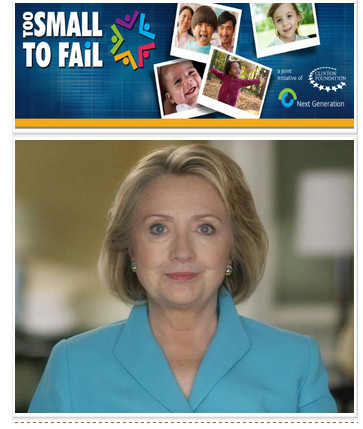Yet, if you put the following terms into a Google search [Hillary Clinton + projects] it yields page after page of articles about the scrapping of proposed movies about Hillary and not a single piece about the prodigious work she continues to do in her post-official world. Appalling!
Last night she received the National Legacy Award from Save the Children at a Gala hosted by Calvin Klein, and the night before the Children's Defense Fund honored her. In both cases the accolades were for the work she has done all of her professional life for children. She has continued this work, too, as a private citizen with Too Small to Fail, an initiative she launched in June of this year during CGI America in Chicago, her first official project since leaving Secretary of State.
Just prior the this year's CGI she announced and met with a leadership and advisory board for Too Small to Fail. Here is their latest post. Do not let anyone tell you that the only Hillary Clinton projects are movies that have been jettisoned. Our Hillary is a very busy and productive private citizen who continues to work for the well-being of all.
Closing the Word Gap for America’s Children
Some precocious toddlers use many different words when communicating early on in their lives, while others appear to struggle through a few small words or phrases. While sometimes a limited vocabulary in a child’s early years may be due to a developmental problem, most often children with fewer words have simply not heard as many words as they needed to in order to effectively express themselves.Put simply, children learn words that they hear spoken directly to them, and if they hear too few words and have too few conversational interactions while they are learning to speak, their vocabularies suffer. But so may their ability to succeed in school later on.Researchers have found that children in low-income households often have less language stimulation than children in high-income households, resulting in a marked word gap that affects their early learning and preparation for school. In fact, the seminal research of Drs. Betty Hart and Todd Risley found that children in low-income homes hear 30 million fewer words by age four than children in high-income homes. Unfortunately, children who struggle with a limited vocabulary in kindergarten continue to struggle in seventh grade, in high school and even into adulthood.Several pilot studies in communities across the country – including the Thirty Million Words Project in Chicago and Providence Talks in Providence, Rhode Island – are showing that parents who talk directly to their babies and toddlers often and in an engaging way can help their children develop their vocabulary more fully and positively impact their brain development. As parents and caregivers point out objects in a room, or sing songs, or read books, very young children begin to understand the words being used and their context. This word recognition is critical to building their knowledge base for future learning.All of this is good news for kids and parents, because with some support and a few simple tools, parents and caregivers can help their babies express themselves meaningfully for life.
Learn More:
- This resource guide from First 5 California explains how babies develop language and literacy from birth on.
- A report from Stanford University highlights the language gap between low and high income children, and explains why change is possible.
In the News:
- “Children aren’t born smart. They’re made smart by conversation.” Slate. September 2013.
- “The power of talking to your baby.” New York Times. April 10, 2013.

